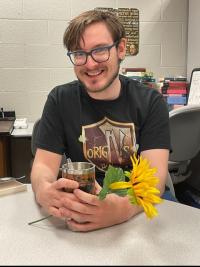Student Spotlight: Logan Grant finds the power in narrative


For fourth-year English major Logan Grant, there is no such thing as a typical week. On any given day, he may consult with first-year composition students for his job in the Writing Center, rehearse an upcoming play or wrestle at Future Great Wrestling. As an English literature major and theatre minor, Grant explores his love of narrative both inside and outside the classroom.
Logan Grant began college as an accounting major, but everything changed when he took English 1110.03, Introduction to Composition, with Professor John Hellmann. In Hellmann’s class, Grant was introduced to new ideas about what it means to study English. Hellmann, who specializes in film, instructed students to write about movies instead of assigned readings. “This was my first time seeing film taught in an English class. I’m not even sure I knew that was possible,” Grant says. “[Professor Hellmann] taught me the artistic depth possible in cinema as well as the artistic value of everyday entertainment.” It was in this class that Grant realized his true passion was in studying narrative.
Hellmann’s class provided Grant with another opportunity as well. Students who take the Intro to Composition course are expected to meet with a writing tutor twice a week. As such, Grant was no stranger to the Writing Center. However, he was surprised when Hellmann recommended him to be a writing tutor. “Typically, tutors were supposed to be at least a sophomore,” he recalls. “It was unusual for a freshman to be recommended as a tutor.” Nevertheless, Grant happily accepted the position. He sees his job as an extension of his English studies. “I’ve gained a deeper appreciation for the art of communication and learned how valuable communication can be,” he says. Being in the Writing Center further cemented his decision to become an English major.
As a writing tutor, Grant’s job consists of meeting with students to revise and research their essays, explaining grammatical rules and writing tips, and training other tutors. Grant appreciates the job because it has helped him become a better writer. “Explaining and teaching essay writing has improved my own writing. I’m more conscious about choosing strong verbs and concrete nouns to make succinct claims.”
When he isn’t studying or tutoring writing, Grant keeps himself busy as a wrestler with Future Great Wrestling in Hamilton, Ohio. He sees a connection between the ways that English and wrestling construct narrative. “Every story being told is told through some language or mixture of languages; wrestling is told mainly through body language,” he says. Grant sees this possibility for storytelling in all aspects of his life. He says that wrestling creates a story over many sessions, like chapters in a book. “In a wrestling match, body slams and suplexes (taking the opponent and carrying them backwards) take the place of words and sentences. I think about the narrative I’m telling whenever I’m on stage or wrestling,” he says.
In addition to wrestling, Grant has been involved with several theatre productions on campus. He began taking theatre classes to improve his stage presence in wrestling, but enjoyed learning about how theatre tells a story. In one acting class, taught by lecturer Margaret Anich, Grant was assigned a particularly difficult character for the final exam. At first, he was uncomfortable with the character because he found him creepy and disturbing. But Anich reached out to him to express her belief that he could take on such a challenging task. “She said I was talented enough to make this character feel more like a real human being. She thought I could make him sympathetic and believable.” Anich’s words inspired Grant to continue theatre. The following semester, he was cast as the antagonist, Krogstad, in A Doll’s House, which was directed by Anich. Understanding the importance of narrative in theatre helped Grant portray these difficult characters. “I love being able to give humanity to characters and to evoke sympathy and empathy for characters that audiences might otherwise be entirely dismissive to or judgmental of,” he says.
As Grant prepares to graduate next semester, he reflects on how the English major has changed the way he views communication and narrative. “How you conceptualize narratives from film, literature, theatre, etc. affects how you think about everything...understanding how a narrative takes shape and how the events in a narrative create greater meanings, some great whole that's much more than the sum of its parts.” Whether in the classroom, on the stage or in the wrestling ring, Grant finds narrative in every part of his life. Grant hopes to continue exploring the way narrative and wrestling connect this summer when he visits the Wudang Taoist Wellness Academy in China.
